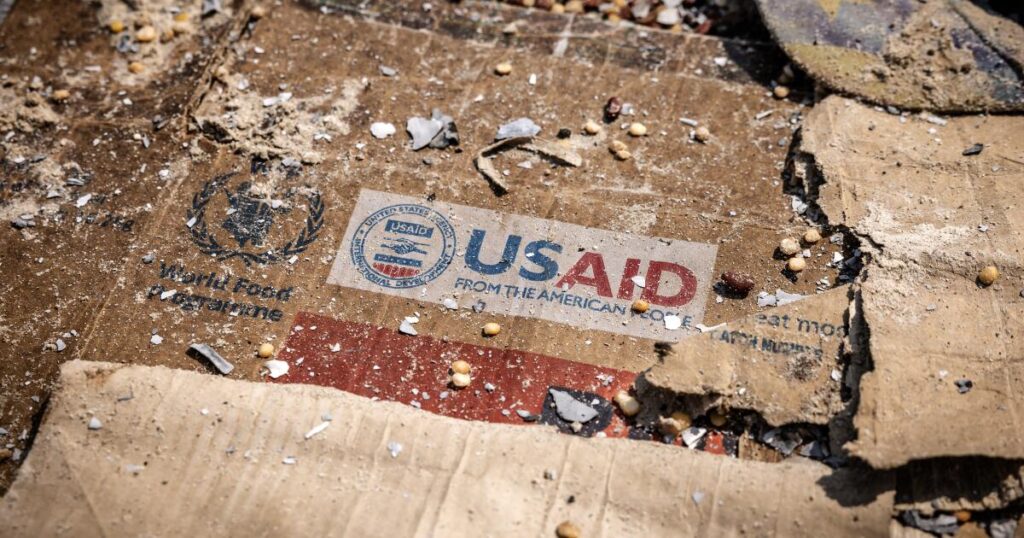American foreign assistance is experiencing an existential moment. The foreign assistance budget appears to be on the chopping block, and the primary agency responsible for delivering foreign assistance, the U.S. Agency for International Development, is undergoing rapid, unplanned disassembly. Some are saying it’s time to give up on foreign assistance altogether, but is it?
As someone who worked on USAID-funded projects around the world for nearly 15 years, I can say that USAID deserves much of the criticism it receives — critiques such as poor performance, misplaced focus and insubordination. Many of its projects run far behind schedule or fail to achieve their intended results. Others appear to be poorly aligned with U.S. foreign policy objectives or simply disconnected from them. Even the more successful programs cost substantially more than one might expect. And U.S.-based contractors and nongovernmental organizations take home a large portion of the assistance, all while working on contracts and grants that minimize their risk and guarantee a profit (where permitted).
But our strategic interests, including energy, critical minerals and counterterrorism, among others, span the globe. A few billion dollars wielded effectively in countries around the world can do far more for American interests than some want to believe, especially in the long run. Dismantling the agency may be something we come to regret.
Foreign assistance fills the liminal space between harder and softer forms of power, reducing friction in the sometimes fraught but often low-stakes interactions that comprise the bulk of international political engagement. For example, military power is of little use in convincing a small, cash-strapped ally or friend to devote more energy to disease surveillance. Similarly, sometimes pure persuasion won’t cut it. Only aid, in the form of security assistance, development projects or both, will change minds. And sometimes the stakes are high — such as convincing a would-be adversary to allow U.S. forces to hunt terrorists on its territory, when doing so is likely to generate domestic opposition.
Effectively shuttering USAID will also take important power projection capabilities off the table. As many have already noted, containing disease outbreaks, reducing migration and bolstering political stability are all more difficult without the unique set of skills and expertise built up (often painfully) over decades at USAID. The value of these activities can be difficult to recognize in the short term because they often work far upstream and geographically far away from the consequence they are intended to avert, such as strengthening the justice system in Honduras to reduce migrant flows. But they do have demonstrable value. A safer, healthier, less violent and more prosperous world is in the United States’ interests as much as anyone’s, and foreign aid can help achieve these goals where military force, private interests or markets cannot alone.
After all, America’s international interests will not safeguard themselves. Indeed, Russia, China, Iran and others are continually seeking to promote their own interests in these same places, and at our expense. Even where competition is not particularly acute, in the absence of U.S. leadership the “jungle grows back,” often in the form of security challenges, disease outbreaks or humanitarian crises that would’ve been much more easily and cheaply dealt with when they were small.
Despite some occasionally well-founded grumbling about ineffective or poorly designed projects, Congress has generally understood these fundamentals well. That’s why the foreign assistance budget and USAID have survived previous rounds of cost-cutting, even when the Trump administration itself has initially attempted to reduce or even zero out large portions of the foreign assistance budget. Now, however, U.S. foreign assistance is truly in danger of being eliminated or dramatically reshaped.
As satisfying as it may be to some to imagine USAID being fed to the woodchipper, the right move is to fix foreign assistance. This may not feel as decisive or effective, but doing so could reduce costs while also making U.S. foreign assistance more targeted and focused on American interests. There is already a strong if scattered playbook available to lawmakers.
First, Congress needs to reassert its budgetary authority. Congress is the appropriate venue for deliberating and determining the tradeoffs associated within the foreign assistance budget and across the government as a whole. If the American people, in whose name foreign assistance is literally delivered, are unhappy with where their tax money is going, then their elected representatives can and should reshape their appropriations to bring spending back into line. (Foreign aid generally represents about 1% of federal spending.) When coupled with rigorous oversight, more competitive processes for distributing assistance dollars and more innovative approaches to partnership and financing, the potential to decrease costs and increase effectiveness is enormous.
Second, policymakers should remember that foreign assistance is not charity. Assistance has long been a crucial component of American foreign policy, and tied to specific national objectives. The fact that foreign assistance efforts, if effective, will produce positive outcomes for the country in question should not obscure the fact that assistance is ultimately intended to make life safer, healthier and more prosperous for Americans. Even if “America first” is the objective, achieving it doesn’t mean “America only” is a viable strategic choice.
Policymakers should assign values to specific foreign assistance efforts and make strategic tradeoffs to further the interests of the United States. Programs that are ineffective or that are not reflective of American values should be cut. In light of looming fiscal challenges, that may well mean a smaller foreign assistance budget, but it should also mean a more nimble, focused and self-consciously American one as well.
Ryan Crow is the director of program design, impact and implementation at the R Street Institute, a think tank in Washington.



